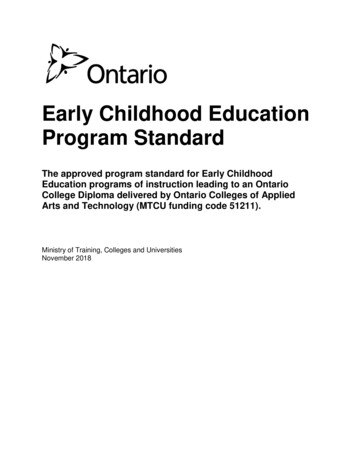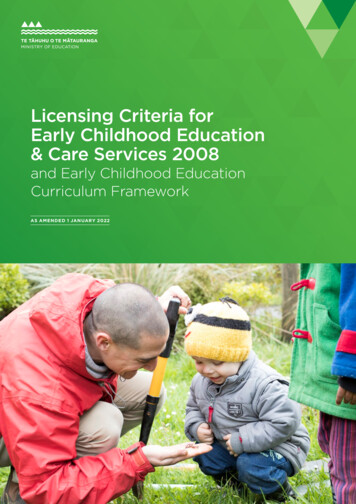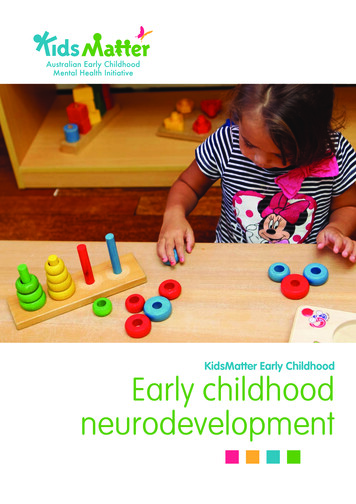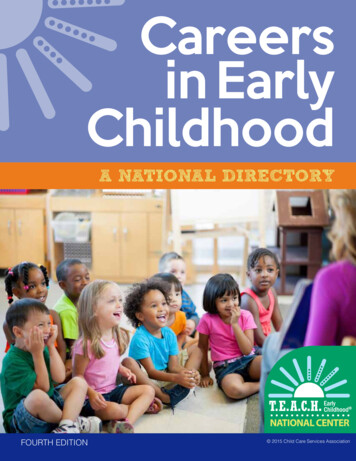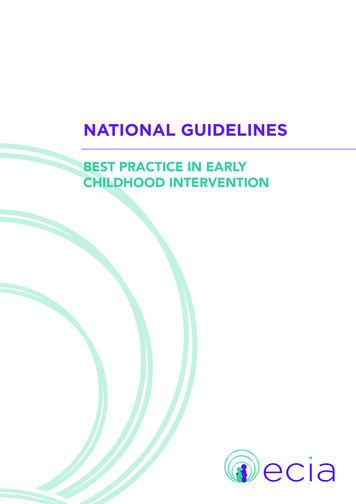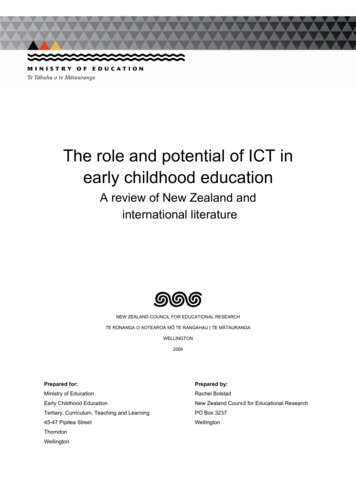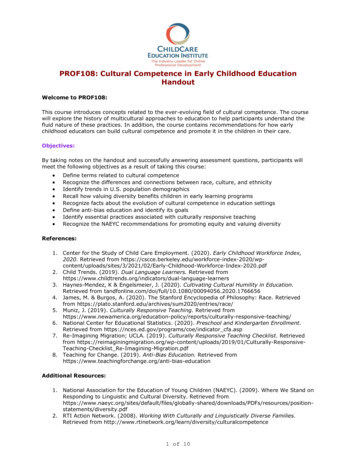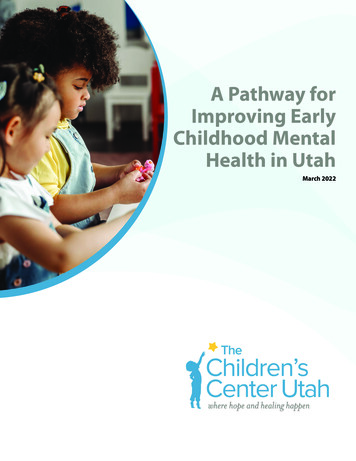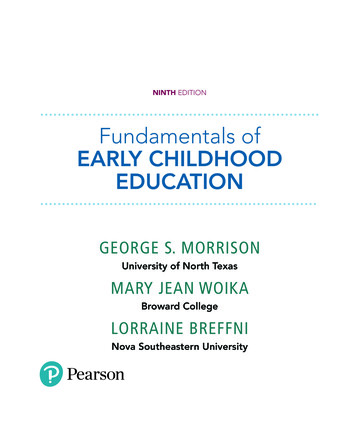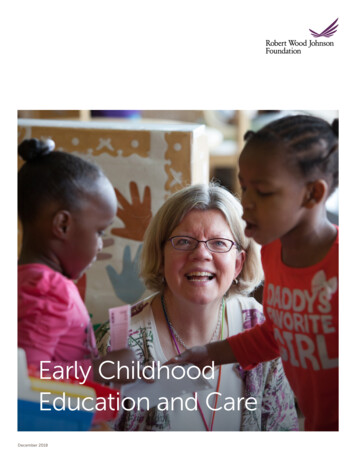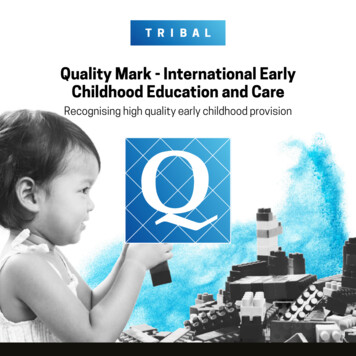
Transcription
Quality Mark - International EarlyChildhood Education and CareRecognising high quality early childhood provision
An introductionWelcome to the International Early Childhood Educationand Care Quality Mark (IQM-ECEC). This award builds onBenefits of the InternationalQuality MarkExternal validation and acknowledgement of provisionundertake regular reviews to identify the impact ofthe Tribal Quality Mark for Early Years, taking account that has moved beyond meeting basic requirements intheir practice.of recent studies that reflect the increasing attentionECEC practice, progress and performance.being given to early childhood educational issues andquality standards at an international level. Valuable public recognition of the impact of the workcurrent provision and support improved outcomes forof leaders, managers and practitioners in improving thechildren.This handbook provides an overview of the context andquality of provision for the young children in their careprinciples of the award which lead to external validationand the standards they achieve.of high quality education and care for young children.The IQM-ECEC is supported by an accompanying auditThe process of audit and self-review will add value toThe IQM takes account of indicators widely acknowledgedto contribute to the quality of early education and careHelps every provider of early childhood education andwhile recognising that the approach to supportingtool designed to enable participating settings to care continue to think about how to improve furtherchildren’s welfare, learning and development variesprogress towards accreditation. The audit tool sets outthe quality of service they offer to young children andaccording to the cultural and social context of eachthe early education standards that settings must meettheir families.country and each setting.Provides a holistic evidence base for continuousIt was a really helpful tool for reflection onin addition to remaining compliant with all local/nationalregulations for children’s learning and welfare. improvement through the multi-dimensional aspect ofour setting in Budapest. I appreciated theThe Quality Mark framework supports effective self-Quality Mark. QM includes structural characteristics,evaluation and continuous improvement within thesuch as adult-child ratios and practitioneremphasis on practitioners’ understanding ofcontext of internationally shared views that high qualityqualifications that are often regulated according toECEC programmes have a positive and lasting impactthe local/national context. These are interwoven withchild development. The self-assessment tool ison children’s well-being, learning and development.process quality factors, such as the pedagogicalreally useful and it made me think about what isapproach and types of interactions that influence thein place currently in our setting and also wherequality of children’s experiences in ECEC settings. Leaders/managers and practitioners are taken througha process of rigorous self-evaluation to identifystrengths, prioritise key areas for development andwe need to make improvements. It is certainly auseful tool for schools to use.EARLY YEARS LEADER AND NORD ANGLIA TEACHINGFELLOW, BRITISH INTERNATIONAL SCHOOL, BUDAPEST2WWW. TRIBALGROUP.COM/SCHOOLS 44 (0)117 311 5266 ENQUIRIES.QUALITYMARK@TRIBALGROUP.COM3
Background of the award“Quality Mark has the benefit of ensuring childrenAn internationally shared view of effective teaching and early learningare being taught basic skills well and that any gaps inattainment and progress are identified early; it alsoThe Quality Mark for schools was developed in 1996 toholistic concept that involves developing children’sprovide a framework to promote, support and celebrateinterrelated and mutually reinforcing, physical, social-the improvement of literacy, language and mathematics.emotional and cognitive skills (Tinajero, Loizillon, 2012).The framework was extended to include Early Yearsensures that we are forever striving for improvement.”LISA HUMPHERYES, DEPUTY HEADTEACHER,RUSH GREEN PRIMARY SCHOOLin 2008 in recognition of a growing understandingThe IQM is based on this consensus. The requiredthat high quality early childhood experiences haveelements of the award reflect the themes and keylasting benefits for young children (Sammons, P. etdomains of the OECD’s ongoing survey, ‘Starting Strong’al 2008). Implementation of the Tribal Early Years(OECD 2012, 2017a) and those that are being included inframework followed a national pilot funded by thethe International Study of Early Learning and Child Well-Quality Improvement Agency (QIA). Participants includedBeing (OECD 2017 b). These studies reflect a growinglocal authority advisers and early years practitionersbody of research, from neuroscience, that the quality ofrepresenting the maintained, private, voluntary andECEC provision is the most significant factor underlyingindependent sectors.the long-term impact on children’s outcomes, fosteringcognitive and non-cognitive skills which are important forThe IQM builds on the Quality Mark Early Years to supportsuccess in later life.those who lead and work in ECEC, within and outside theUK, to undertake effective self-evaluation and continuous‘Starting Strong 5’ highlights that, “the brain sensitivity ofimprovement which drives better outcomes for children,highly important developmental areas, such as emotionaltheir families and society. The updated guidance andcontrol, social skills, language and numeracy, peaks in theaudit tools reflect findings of international studies whichfirst three years of a child’s life.” (OECD 2017). As theseidentify shared views of high quality ECEC provision anddomains are integral to the IQM, ECEC settings who meetits short and long-term, positive impact on children’sthe requirements of the 10 elements can be assured thatlearning (e.g. Sammons et al., 2008, Melhuish 2004;they are evaluating their provision against internationally2011).shared views of effective early learning.Empirical research into how children’s competenciesdevelop and are interconnected continues to evolve,however, there is a consensus that early learning is a4WWW. TRIBALGROUP.COM/SCHOOLS 44 (0)117 311 5266 ENQUIRIES.QUALITYMARK@TRIBALGROUP.COM5
A National and InternationalAgendaCompleting theInternational Quality MarkThe IQM, and associated audit tool, complement andIQM activity can stand alone or complement andsupport national and international visions of a dynamicintegrate with other local and/or national initiativessector that delivers high quality early education and care.to improve young children’s achievements. ThoseThe process of reflection and self-evaluation is integral towith responsibility for leading the process in yourthe IQM and is key to the accreditation process.setting control the timescale for submitting theIQM portfolio. The length of time taken to achieveAs leaders and practitioners gather evidence of theiraccreditation will vary according to your setting’sprovision and practice, they engage in robust self-starting point and its ability to demonstrateevaluation, identify strengths and areas for improvementprogress and sustained good practice.and set and implement targeted actions to support furtherAll practitioners, and others involved with theimprovement.setting, whether paid or voluntary, should beinvolved in helping to achieve the IQM award.The initial phase of evaluation and evidence gatheringInvolvement in the process will contribute to theoften takes between 12-18 months to complete. Thisdevelopment of leadership and management skillsprocess will give proprietors, leaders and practitionerssuch as auditing, action planning, monitoring andconfidence to explain their cycle of review and continuousevaluating, in a practical context and with a tangibleimprovement. Those involved will find that the informationoutcome.collected is a valuable source of evidence for any systemof regulation and/or inspection that has high expectationsProprietors, management committees andof quality in early childhood settings.governing bodies, or their equivalent, will findthat work undertaken to achieve and sustain theIQM award offers a meaningful context in whichto monitor and evaluate the quality of provision,practice and outcomes and to demonstrate howthey are actively carrying out their role to drivecontinuous improvement.6WWW. TRIBALGROUP.COM/SCHOOLS 44 (0)117 311 5266 ENQUIRIES.QUALITYMARK@TRIBALGROUP.COM7
Impact of the InternationalQuality MarkAs parents/carers become ever more demandingunderstanding of the social and cultural contexts in whichconsumers of early childhood services, they seekchildren live, to support children’s physical well-beingassurance that those who educate and care for theirand motor development, social-emotional development,young children meet their individual needs and preparelanguage and cognitive abilities during this crucial phasethem well for school and later life.of life.Proprietors and leaders who have a strong commitmentThe criteria of the IQM are based on a generalto continuous quality improvement are most likely tounderstanding that young children learn best whensucceed in reassuring parents/carers that they willthey are well-cared for in a nurturing and supportivepromote the best outcomes for their children.environment. A significant focus is given to how wellpractitioners support children to learn through differentAchievement of the IQM-ECEC Quality Mark willtypes of play, which is recognised as being so importantcontribute positively to parents’/carers’ confidence andto children’s well-being and development that it is setconsequently to the sustainability of the setting, schooldown in the United Nations Convention on the Rights ofand business.the Child (1989).The International Quality Mark ApproachParticipants undertaking the award will show that theyThe IQM uses studies of international best practice toprovide benchmarks against which leaders, practitionersand other stakeholders can evaluate their provision,whatever teaching method/approach they choose touse. The criteria required to meet the elements are notprescriptive. However, those who embark on the processwill be expected to show that they recognise that theearly years of a child’s life are a period of intense learningunderstand that self-evaluation and quality assuranceprocesses are not one-off, short-term activities. Theprocess, and the actions which follow, must enhancethe provision for children’s care and learning. Settingsachieving the award will show that they give childrena strong start to help them to become well-rounded,confident individuals who are prepared for their nextstage of learning and for their place as global citizens.and development. It is expected that practitionerswill use developmentally appropriate practices, aninformed knowledge of the needs of each child and an8WWW. TRIBALGROUP.COM/SCHOOLS 44 (0)117 311 5266 ENQUIRIES.QUALITYMARK@TRIBALGROUP.COM9
The International Quality MarkframeworkA comparative modelYour Early Childhood Education and Care setting will achievethe IQM when you demonstrate that the criteria for all 10elements are met and provide evidence that participationin the award has had a positive impact on provision andpractice.You can be confident to share with parents, and otherinterested parties, that the IQM elements are reflectedin international studies of ECEC quality monitoring andrelevant to the expectations of inspection, accreditationand regulatory frameworks.The table on the next page illustrates how the IQMelements align with a range of key levers, processes andsystems used to measure the quality of early childhoodeducation and care in different contexts.“We will be improving our hearing journals,including more photographic evidence. Doingthe QM helps to focus on the above areas and toreflect on them. A very useful tool which we useto help improve our nursery and what we offer.”QUALITY ASSURANCE MANAGER, GLAISDALE DAYNURSERY10WWW. TRIBALGROUP.COM/SCHOOLS 44 (0)117 311 5266 ENQUIRIES.QUALITYMARK@TRIBALGROUP.COM11
QUALITY MARK ELEMENT112A whole settingstrategy to improvechildren’s abilitiesand achievementsOFSTED COMMONINSPECTIONFRAMEWORKLeadership andmanagement (integral toall key judgements)NATIONALASSOCIATION FORTHE EDUCATION OFYOUNG CHILDRENACCREDITATIONSTANDARDLeadership andmanagement (10)Curriculum (2)Assessment (4)Health (5)STANDARDS FORBRITISH SCHOOLSOVERSEASOECD STARTINGSTRONG III AND IVQuality of educationprovided (Part 1)Spiritual, moral, social andcultural development ofpupils (Part 2)Welfare, health andsafety of pupils (Part 3)Suitability ofpractitioners, supplypractitioners andproprietors (Part 4)Premises andaccommodation (Part 5)Leadership andManagement (part 8)Quality GoalsCurriculum and learningstandardsData, research andmonitoring2An analysis of theassessment of youngchildren’s abilitiesand achievementsLeadership andmanagementTeaching, Learning andAssessmentPersonal Development,Behaviour and WelfareAssessment (4)Leadership andmanagement (10)Quality of educationprovided (Part 1)Leadership andManagement (part 8)Data, research andmonitoringMonitoring childdevelopment andoutcomes3Setting appropriatelyhigh expectationsfor young children’sdevelopmentLeadership andmanagementTeaching, Learning andAssessmentPersonal Development,Behaviour and WelfareTeaching (3)Curriculum (2)Relationships (1)Leadership andmanagement (10)Quality of educationprovided (Part 1)Spiritual, moral, social andcultural development ofpupils (Part 2)Leadership andManagement (part 8)Curriculum and learningstandardsMonitoring childdevelopment andoutcomes4Planning ‘nextsteps’ in learningfor young children’sdevelopmentTeaching, Learning andAssessmentCurriculum (2)Teaching (3)Quality of educationprovided (Part 1)Spiritual, moral, social andcultural development ofpupils (Part 2)Curriculum and learningstandardsMonitoring childdevelopment andoutcomes5Regular review ofprogress made by allchildrenLeadership andmanagementTeaching, Learning andAssessmentAssessment (4)Leadership andmanagement (10)Quality of educationprovided (Part 1)Leadership andManagement (part 8)Monitoring childdevelopment andoutcomesWWW. TRIBALGROUP.COM/SCHOOLS6A commitment toimproving the skillsof all practitionersLeadership andmanagementTeachers (6)Leadership andmanagement (10)Quality of educationprovided (Part 1)Leadership andManagement (part 8)Workforce QualityMonitoring ofpractitioners’ qualitylinked to professionaldevelopment7A balanced use ofchild-initiated andadult-guided playbased activitiesLeadership andManagementTeaching, Learning andAssessmentPersonal Development,Behaviour and WelfareTeaching (3)Curriculum (2)Relationships (1)Quality of educationprovided (Part 1)Spiritual, moral, social andcultural development ofpupils (Part 2)Leadership andManagement (part 8)Curriculum and learningstandardsWorkforce Quality8The use ofappropriateenvironments andresourcesLeadership andManagementTeaching, Learning andAssessmentPersonal Development,Behaviour and WelfarePhysical environment (9)Quality of educationprovided (Part 1) Welfare,health and safety ofpupils (Part 3)Premises andaccommodation (Part 5)Quality GoalsCurriculum and learningstandards9Partnership workingbetween families,carers, practitionersand professionalsin supporting youngchildren’s learningand developmentLeadership andManagementTeaching, Learning andAssessmentPersonal Development,Behaviour and Welfare(N.B the domain ofphysical developmentis expected to includehealth, growth andfitness and sensory/motor development)Families (7)Community relations (8)Health (5)Quality of educationprovided (Part 1)Spiritual, moral, social andcultural development ofpupils (Part 2)Welfare, health andsafety of pupils (Part 3)Provision of information(Part 6)Family and communityengagementcollaboration betweenpractitioners and parents.Quality GoalsCurriculum and learningstandardsMonitoring childdevelopment andoutcomes.10An effectiveprocedure formonitoring planningand assessingimprovementin practice andprovisionLeadership andManagement (& integralto all judgements)Leadership andmanagement (10)Leadership andManagement (part 8)Monitoring thequality of curriculumimplementation,practitioners- childinteraction, teachingand care, collaborationbetween practitioners,responsiveness to child’sneeds, collaborationbetween practitionersand parents. 44 (0)117 311 5266 ENQUIRIES.QUALITYMARK@TRIBALGROUP.COM13
Frequently Asked QuestionsWho can apply?How is the provision assessed?The IQM (ECEC) is available to all registered/licensedAn early childhood specialist, accredited by Tribal, willproviders of early childhood education and care for childrenreview and evaluate the electronic portfolio of evidencefrom birth to statutory school age. This includes forsubmitted and carry out an assessment visit to yourexample, nurseries, early childhood centres, playgroups,setting. The recommendation for the International Qualitypre-schools, Reception classes and ECEC provisionMark award can only be made by an accredited assessor.in independent, private, voluntary and maintained/There is no prescribed start or end date for the award.government schools.Applications can be made throughout the year.ECEC providers and schools interested in accreditationECEC settings spend varying amounts of time workingAssessment is not based solely on an evaluation oftowards accreditation depending on their starting points.the evidence submitted or a review of documents. TheThey must show that all elements of the IQM elementsassessor will gather additional evidence during focusedare met before the award can be granted. It is not possibleobservations of practice during the evaluation visitto gain accreditation by making a commitment to meetand/or a ‘learning walk’ around the setting or school. Anall elements in the future. Evidence to show that theassessor will also seek evidence through discussion withquality of provision and practice meets the criteria forkey stakeholders, such as practitioners, parents/carers,each element should come from a wide range of sources.representatives of any management committee, advisoryPossible sources are included, but not limited to, thegroup or governing body. Where appropriate, assessors willexamples included with each element in the handbook.talk to and take account of the views of young children.should contact : enquiries.qualitymark@tribalgroup.What does the evidence about thepractice and provision need to show?com to receive details of the award, the support availableThere is no prescribed amount of evidence required toIt is expected that any improvements that take place addAn ECEC provider in a setting or school provision will beand associated costs.substantiate each element. Participants may find that theyvalue to the provision and in most instances, relate to arequired to show that at the time of the assessment:have much of the evidence readily available, as it will haveperiod lasting longer than one academic year.How long is the IQM award valid?been gathered for other purposes. Each setting should The IQM is awarded for two years. At the end of that periodit meets the appropriate criteria for its context in all 10make a professional judgement in selecting the mostIQM elementsappropriate evidence to illustrate how they meet criteria inthe award can be renewed for a further two years (and insubsequent cycles) providing the setting continues tothe context of their setting. As highlighted in the audit tool the whole setting/school is committed to improvingmeet the criteria for all 10 elements and can demonstrateguidance the same piece of core evidence may be usedcommunication, language, literacy and mathematicsthat holding the IQM has had a positive impact on itsfor more than one element, provided the analysis relatestaking account of the age and stage of developmentprovision and practice. This includes an ongoing emphasisto the relevant criteria. Evidence should be presentedof each child and within the relevant learning andto the areas of communication, language and literacyelectronically. The choice of format is a decision for thedevelopment frameworksetting, but should enable the assessor to easily identifyas well as mathematics within with the relevant ECECframework/curriculum.planning, provision and impact. The self-audit tool maybe the abilities and achievements of young children ina useful working document to support the collation ofcommunication, language, literacy and mathematicsrelevant evidence.are improving.How is achievement of a Quality Markrecognised?The International Early Childhood Education and CareQuality Mark is awarded by Tribal and is only availableto settings that have been assessed as meeting theaccreditation standard. Schools and ECEC settings holdingthe award are entitled to display the logo, which is suppliedelectronically, on information and publicity materials, suchas a letterhead, prospectus or advertisement. Those whoachieve the award also receive an award certificate.For further information on the Quality Mark pleasecontact: enquiries.qualitymark@tribalgroup.com14WWW. TRIBALGROUP.COM/SCHOOLS 44 (0)117 311 5266 ENQUIRIES.QUALITYMARK@TRIBALGROUP.COM15
enquiries.qualitymark@tribalgroup.com www.tribalgroup.com/schools
The framework was extended to include Early Years in 2008 in recognition of a growing understanding that high quality early childhood experiences have lasting benefits for young children (Sammons, P. et al 2008). Implementation of the Tribal Early Years framework followed a national pilot funded by the Quality Improvement Agency (QIA).
